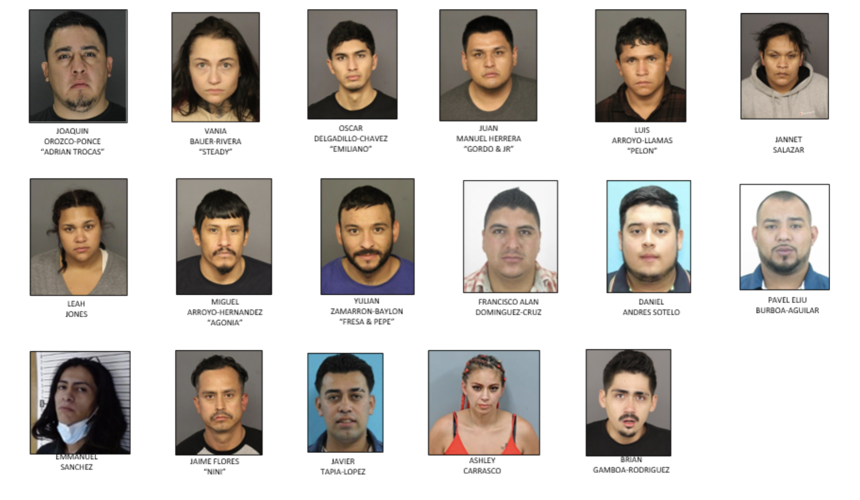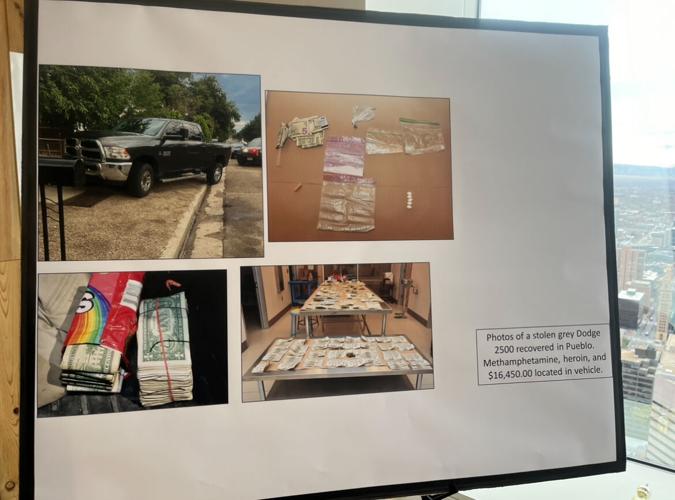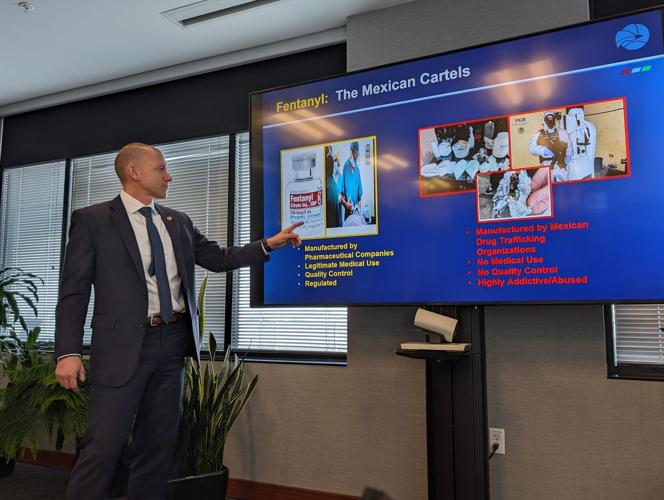I-25, I-70 corridors made Denver target for car theft ring

The Denver District Attorney’s office on Monday announced the indictment of 17 suspects allegedly involved in an elaborate car theft ring connected to 190 stolen vehicles in metro Denver. Some of the stolen vehicles were exchanged in Mexico for illicit drugs to be smuggled into the United States.
Courtesy photo, Denver District Attorney's Office
The intersection of Interstate 25 and Interstate 70 put Denver in the cross hairs of a car theft ring linked to the Sinaloa drug cartel in Mexico.
Denver’s highly populated metro area is a natural target for cartels but it’s the freeway corridors that draw criminal activity, according to David Olesky, assistant special agent in charge at the U.S. Drug Enforcement Administration Rocky Mountain Field Division.
Cartels use the freeways to transport stolen vehicles and drugs, leaving traces of their activity behind in nearby Colorado cities.
“Do they pick Colorado out and say they want to be here specifically? No. But they do operate everywhere, and Colorado is not immune to that,” Olesky said.
The Denver District Attorney’s office has linked a group allegedly behind the theft of nearly 200 cars to the Sinaloa drug cartel.
Some of those vehicles — notably pickup trucks — were exchanged in Mexico for illegal drugs that were then smuggled into the United States, according to officials.
The district attorney’s office indicted 17 people allegedly involved in the elaborate car theft ring.
Prior to the indictment, members of various law enforcement agencies had been meeting over the past year to discuss an epidemic of stolen vehicles in the region.
There were 32,976 reported stolen vehicles in 2023 and 41,656 in 2022, according to Colorado’s Auto Theft Annual Report.
In one meeting, the Department of Justice asked federal agencies to commit resources to address the threat to public safety of the ongoing car thefts, according to Olesky.
That work between various departments and agencies eventually led to the indictment and involved a taskforce including the Federal Bureau of Investigation, Homeland Security Investigations, the DEA and local police departments and sheriff’s offices.
Olesky called the car theft ring indictment — which stemmed from investigations starting in September 2022 — a perfect example of the collaborative work local police departments and federal agencies do in order to disrupt cartels.
“This is something that the public can see. They might not think that their stolen vehicle they use to get to work every day is showing up in the hands of the Mexican cartel,” Olesky said.
The operation
Denver District Attorney Beth McCann and members of the Colorado Metro Auto Theft Task Force, including the DEA, met on the 53rd floor of the district attorney’s office on Dec. 9, to announce the indictment of 17 suspects involved in a car theft ring that had stolen $9.5 million worth of property in Denver and at least 190 vehicles.
The two-year operation saw members steal vehicles and drive them down to the El Paso border to meet with cartel members. The suspects would then exchange the vehicles for illegal drugs to smuggle back into Colorado, according to investigators.
While the drugs mostly included cocaine and methamphetamine, fentanyl was also found.
The “sophisticated” operation would target vehicles, deactivate key fobs and use counter surveillance to make sure no police were in the region, according to Olesky. Sometimes the members used methamphetamine to keep themselves energized for a night of thefts.
They became so good at it that cars would be stolen in a flash and taken to Mexico within 24 hours.
The majority of car thefts occurred near the Denver International Airport and included large pickup trucks — a request by the Sinaloa cartel, which wanted to use the trucks to transport armor and weapons throughout Mexico, according to Olesky.
The indictment shows the 17 suspects are facing 222 counts of vehicle theft, menacing, drug smuggling and identity theft and it details countless charges in which both vehicle theft and drug running were occurring.
For example, on or about April 29, 2023, two of the suspects exchanged messages regarding the importation and distribution of cocaine. One of the suspects explained that another was picking up money so he can pay “Gabo” in Mexico, according to the indictment.
The two continued discussing sending trucks and money to Mexico, getting paid for the trucks in Mexico and providing money to the “old man” in Mexico, who then provides “the white,” a common slang term for cocaine, which is then sold in Denver.
In one of the messages, one of the suspects detailed paying for the cocaine in trucks instead of money.
Between May 30, 2023 and June 19, 2023, suspects stole a black 2022 Ram TRX from the DIA West Economy Lot at 8148 Pena Blvd. The value of the stolen vehicle was approximately $85,842, according to the indictment.
Not all of the 17 suspects are in custody. Eleven are, but six remain on the loose, according to the DA’s office.
Officials said some of the suspects were caught. Others are at-large either in Texas or Mexico.
The suspected ringleader, Joaquin Orozco-Ponce — known as “Adrian Trocas” — remains at-large. He faces a $10 million bond once arrested on the felony charges, according to officials.
Regarding why the DEA was involved even though the investigation started as a car theft operation, Olesky noted a correlation with drug smuggling and distribution.
While the cause of drugs being involved in criminal enterprises can be debated, the connection is obvious.
“There is no doubt a correlation between illegal drugs, violent crime and organized crime and how often times illegal drugs are the source of revenue for these criminal groups,” Olesky said.
After hearing about the large quantity of cars being stolen, DEA officials knew that they needed to have a role in the CMAT investigation.
“We can use our investigative tools to have a bigger and more impactful result,” Olesky said.
Cartel presence in Denver
“When you hear Mexican cartel, you think of that as an organization happening somewhere else. The criminal activity that fuels the enterprise is within the United States,” Olesky said. “This particular operation showed that the stolen car enterprise was just another line for them to profit from.”
In an interview earlier this year, Rocky Mountain Field Division Field Intelligence Manager Scott Rowan said that every bit of fentanyl distribution in Colorado is linked to two major Mexican cartels, the Sinaloa and Jalisco New Generation.
“You might be focusing on a single distributor here, but if it’s elicit fentanyl it will trace back to one of them,” Rowan said of the cartels. “You may have to go back a few levels. An operation here may stem back to California and Arizona before Mexico, but it will go back there.”
Whether or not the members of the car theft ring are direct members of the cartel doesn’t really matter, according to Olesky. He said a level of trust is built between the criminals and the corresponding cartels.
Olesky said DEA agents are involved in every gang task force operation throughout the state, including those of the Denver Police Department and Aurora Police Department, and they keep in constant communication.
For an example, Olesky pointed toward the ongoing activity of Venezuelan prison gang Tren de Aragua in Aurora.
“Nowadays, there’s such a debate (over) Venezuelan criminal activity in Aurora,” he said. “Is the individual a member of Tren de Aragua or are they not? The bottom line is the conduct is organized criminal activity. Whether or not we classify that as being part of a specific gang or not, they are on our radar because it’s organized criminal conduct.”






